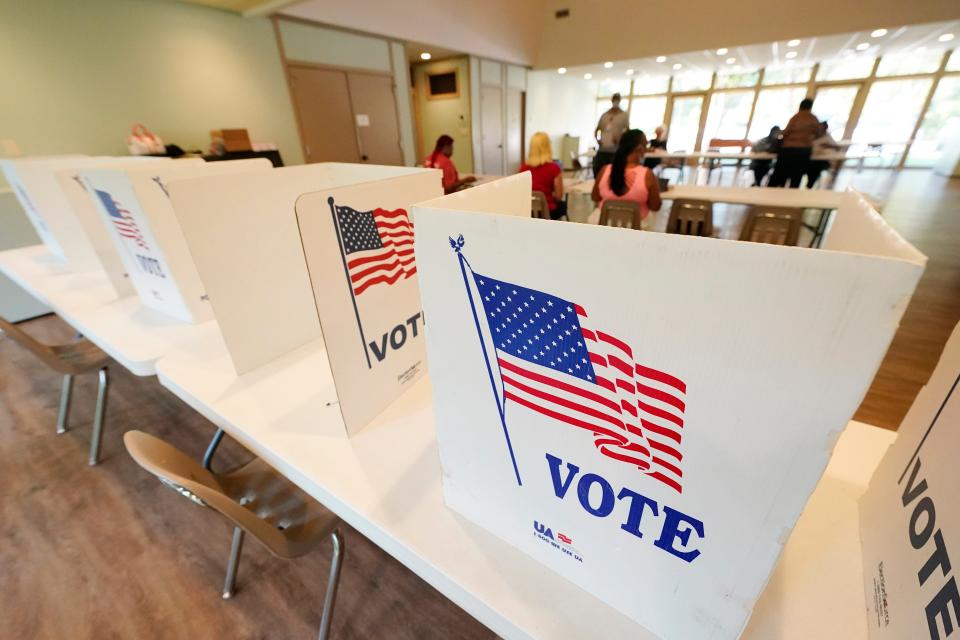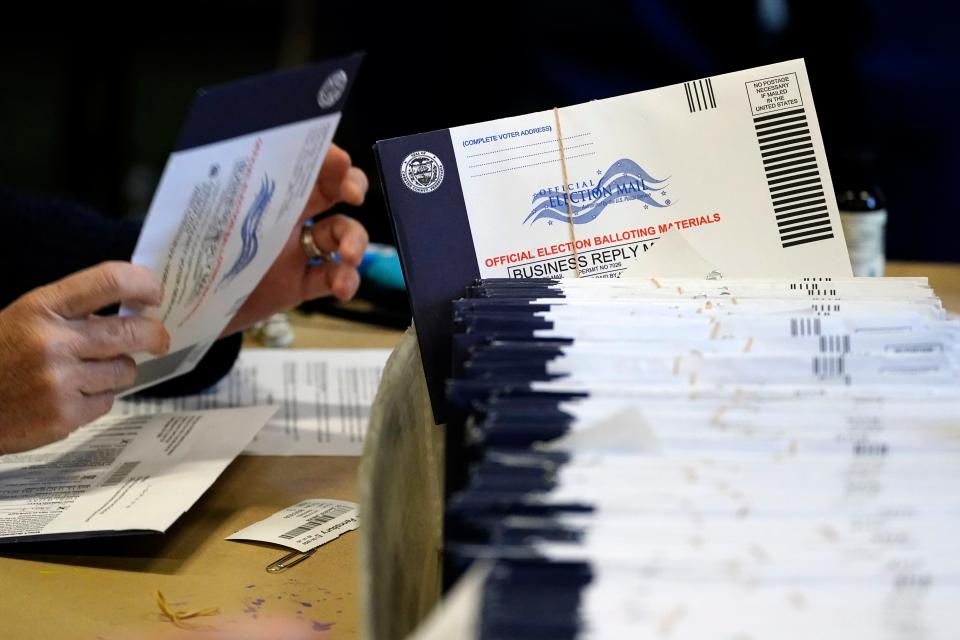Massachusetts man gets 3.5-year sentence for election threats against Arizona officials
- Oops!Something went wrong.Please try again later.
A Massachusetts man was sentenced to three-and-a-half years in prison Tuesday for making a bomb threat to the Arizona secretary of state’s office – one of the heftiest sentences yet under a federal task force cracking down on election threats.
James Clark, 40, of Falmouth sent a message in February 2021 to an unnamed election official via a secretary of state’s office website, according to court records. The threat warned that if the state attorney general didn’t resign within two days, a bomb would go off in her office, according to court records.
U.S. District Judge Michael Liburdi in Phoenix sentenced Clark to a term that tied for the longest handed down for election threats since the 2020 campaign.
The threat is one of thousands the Justice Department reviewed for potential criminal charges as part of an Election Threats Task Force, which Attorney General Merrick Garland announced in June 2021.
The other defendant to receive a 42-month term was Frederick Goltz of Lubbock, Texas, who also posted threatening messages against an official in Arizona. The victim, a deputy county attorney who worked on elections, testified at Goltz’s sentencing in August that he, his wife and four children were assigned round-the-clock protection and issued body armor because of the threat, according to court records.

Threats against election workers surged after Trump's baseless claims of fraud in 2020: DOJ
Threats against election workers spiked after the 2020 election, when former President Donald Trump complained baselessly about widespread election fraud. His fellow Republicans at the Justice Department and in key states such as Arizona and Georgia found no widespread fraud.
“Those using illegal threats of violence to intimidate election workers should know that the Justice Department will find you and hold you accountable under the law,” Garland said. “We will continue to aggressively investigate and prosecute such unlawful threats of violence.”
A similar pattern of electoral intimidation is playing out nationally in voting centers, according to USA TODAY. Tens of thousands of longtime election workers have been harassed out of their jobs by a small cadre of self-appointed voting experts and critics who have hounded clerks to switch to paper ballots, demanded hand-counted results, and insisted they be allowed to participate in ways that are normally barred specifically because they can introduce errors.
More: 'I dread 2024': America's local election officials are being pushed to their limits
More: Election workers faced new threats after 2020 election. Experts fear it will drive them away

Clark threatened 'explosive device' will "be detonated': court records
Clark sent the message Feb. 14, 2021, at 9:52 a.m. local time in Arizona from his home in Yarmouth, according to court records.
“Your attorney general needs to resign by Tuesday February 16th by 9 a.m. or the explosive device impacted in her personal space will be detonated. Thanks!!!!!” Clark wrote, according to court records.
Staffers in the secretary of state’s office didn’t read the message until after the deadline passed. But law enforcement officers partially evacuated the building housing both the secretary of state’s office and the attorney general’s office, along with the election official’s home and car.
“Public servants who ensure our free and fair elections must be able to do their jobs without fear.," said Nicole Agentieri, the principal deputy assistant attorney who heads the department's criminal division.
Later the same day Clark sent the message, computer records showed that he searched online for the election official’s name and “address” and “how to kill,” according to court records. Prosecutors said taking an additional step after making a threat makes a charge more serious.

Clark 'drunken and drugged' when he sent threat: defense lawyers
Defense lawyers said Clark was “drunk and drugged and trolling the internet” while making the threat. Clark didn’t take more actions, such as obtaining bomb-making materials or traveling to Arizona, the lawyers wrote.
“Mr. Clark understands he sent a threatening message that created fear and that in his drunken and drugged state, he must have meant to cause fear, but he never had the subjective intent to follow-through on his threat,” public defenders Jon Sands and Jeanette Alvarado wrote in a filing. “He was far away, with no ready ability or desire to travel to Arizona and no knowledge or access to bomb-making materials to make his empty threat come true.”
Prosecutors acknowledged that Clark had engaged in rehabilitation efforts since the offense.
"But the government also notes that Defendant’s actions caused government employees to fear for their lives and safety and caused law enforcement to expend resources to address what it deemed to be an immediate threat to public safety," prosecutors wrote in a filing. "The government further submits that a term of probation, intermittent incarceration, or home confinement would be wholly inappropriate and would not vindicate the rights of the victims or the public."
This article originally appeared on USA TODAY: Man who claimed bomb plot gets 3.5 years for election threats

